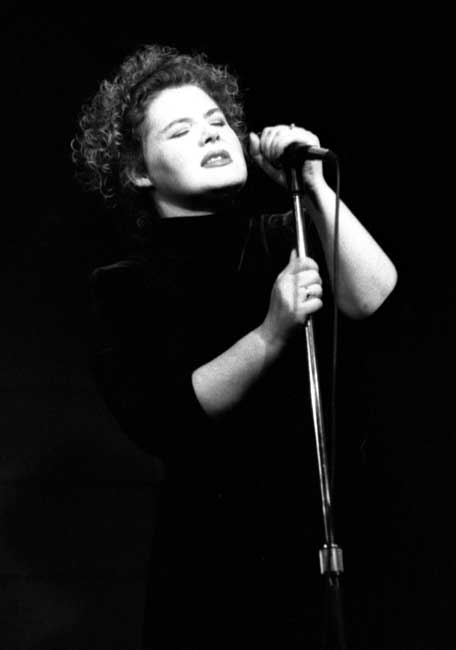Photo Credit: Sherry Rayn Barnett Photography
Maura O'Connell: Her map of the heart's deepest yearnings doesn't really take you to a final destination, but rather suggests the road extends into uncharted territoryThat's The Way Love Goes
By David McGee
NAKED WITH FRIENDS
Maura O'Connell
RounderWhen you're one of the best singers in the world, you can take certain liberties. For one, you can tell those who play an instrument other than their voice to stay home, for once. Moreover, you can tell one of the finest ever to play his instrument of choice that he's free to show up, but only with the instrument hardly anyone has ever heard him use, meaning his voice. You then proceed to present a collection of songs from mostly contemporary sources in such a haunting fashion, and with such stark, otherworldly grandeur emanating solely from the human spirit infusing your every uttered syllable, that the entire exercise begins to take on the aspect of the sort of bone chilling premonition as might be encountered in a Shakespearean soliloquy. Is this a dagger I see before me? No, but it is your true love gallivanting with someone else.
Welcome to Naked With Friends, the stunning new album from the towering Irish singer Maura O'Connell. Now, some wags have already had fun with the title, and even O'Connell herself is quoted somewhere as saying she's not literally naked on the album because no one wants to see her that way. She may underestimate her appeal in that regard, but in fact what's naked here are the voices—O'Connell's first and foremost, with harmony and duet assists from the likes of Alison Krauss, Paul Brady, Tim O'Brien, Darrell Scott, Mary Black, Mairéad Ní Mhaonaigh, Moya Brennan, her sister Áine Derrane and others, all singing a cappella throughout, no instruments to provide the plaintive fills or keening moans many of these songs warrant, only human voices doing so by the sheer force of emotional conviction.
You sense you are on sacred ground from the start, when O'Connell somberly intones the first words of "The Bright Blue Rose" and is joined, successively, by Kate Rusby, then Dolly Parton, in a smooth, lilting blend, and buttressing them, the majestic, spiritually resonant voices of The Settles Connection choir in a song exploring the mystery of Christ's life, death and eternal flame drawing believers to his message. The singing is as full of wonder as the lyrics are evocative in getting to the essence of the Christian experience. The slightest bit of social conscience emerges on a dark, ominous version of Elvis Costello's "Shipbuilding," which rather clumsily expresses anti-war sentiments but is made better than it is by the forcefulness of O'Connell's voice and the contrast in Darrell Scott's gritty second vocal with, once again, the Settles Connection establishing a forbidding backdrop for the singers.
These, a closing number in Spanish, and three songs sung in O'Connell's native tongue, amount to interesting detours off the main path of Naked With Friends, although the untranslated Irish songs may well fit the concept, with fellow Irish music icon Paul Brady supplying a robust vocal on "Anach Cuain" and, in the album's biggest surprise, dobro virtuoso Jerry Douglas sans his dobro but assisting with a resonant, gritty vocal on the traditional Irish tune, "Mo Sheamuseen"—Flux, as he's called, knocks it out of the park in shadowing O'Connell's emotional reading.
Thematically the album begins with the third song, Cheryl Wheeler's beautiful "Arrow," a pop-inflected study of deeply conflicted feelings in which the singer—in one of those classic Shakespearean soliloquy moments—tries to convince herself how wonderful it is to be in love, even as she laments what she lost in parting with her paramour. The intensity of Wheeler's mortification, and the spot-on balance between raw wound and abiding ache O'Connell achieves in her nuanced interpretation, are moments of stupefying beauty. Janis Ian's "Some People's Lives" follows, with Alison Krauss joining in on the chilling chorus, "Didn't anybody tell them/didn't anybody see/didn't anybody love them like you loved me?" But again, it's coming from the vantagepoint of the forlorn, of someone empty and abandoned, rendering the recurrent refrain, "Didn't anybody tell them..." as like salt being poured into an open cut, the singer no longer at a distance but now the target of this existential abnegation. Even when the song has a bright, spirited melody and sprightly rhythm, so do dark shadows loom—"I Know My Love" finds O'Connell and two female companions chirping merrily about their man's unquenchable wanderlust, recognizing it as an inseparable component of his makeup and accepting his rootlessness with fatalistic aplomb. Darrell Scott's powerful "This Beggar's Heart" serves as the bookend to the journey O'Connell has hosted on this disc, as the singer, at wit's end, plaintively documents her expressions of commitment, all of which were rejected, and bids adieu to the one who recoiled from her most dedicated aspirations. In a bit of inspired sequencing the next song, "Maidín i M'Béarra," its melody identical to that of the beloved "Danny Boy," arrives as a soothing balm in all its subdued but evocative beauty, even though its lyrics tell of someone longing for unattainable solitude and peace. That this map of the heart's deepest yearnings doesn't really take you to a final destination but rather suggests the road extends into uncharted territory sounds a whole lot like the way love goes, doesn't it now?
THE BLUEGRASS SPECIAL
Founder/Publisher/Editor: David McGee
Contributing Editors: Billy Altman, Laura Fissinger, Christopher Hill, Derk Richardson
Logo Design: John Mendelsohn (www.johnmendelsohn.com)
Website Design: Kieran McGee (www.kieranmcgee.com)
Staff Photographers: Audrey Harrod (Louisville, KY; www.flickr.com/audreyharrod), Alicia Zappier (New York)
E-mail: thebluegrassspecial@gmail.com
Mailing Address: David McGee, 201 W. 85 St.—5B, New York, NY 10024
Founder/Publisher/Editor: David McGee
Contributing Editors: Billy Altman, Laura Fissinger, Christopher Hill, Derk Richardson
Logo Design: John Mendelsohn (www.johnmendelsohn.com)
Website Design: Kieran McGee (www.kieranmcgee.com)
Staff Photographers: Audrey Harrod (Louisville, KY; www.flickr.com/audreyharrod), Alicia Zappier (New York)
E-mail: thebluegrassspecial@gmail.com
Mailing Address: David McGee, 201 W. 85 St.—5B, New York, NY 10024


